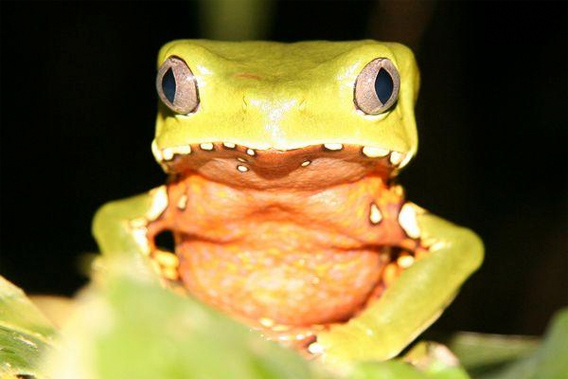
The giant monkey frog (Phyllomedusa bicolor) is known for its mind-altering skin secretions. Shamans in the Amazon rain forest have used this species in hunting rituals. Photo by Rhett A. Butler.
The Brazilian government is stepping up anti-“biopiracy” measures and imposing substantial fines on companies which make use of rare plants or animals without giving adequate compensation to Brazil or its indigenous communities. The move attracts criticism by some who believe that it hampers scientific research.
Brazil’s unique species have been exploited for centuries by businesses which often make fortunes while overlooking local communities. For instance, the slime from Kambo frogs, found in the Amazon state of Acre, has been used by pharmaceutical companies to develop anti-inflammatory drugs without granting Acre residents any of the profits. In the 1960s, the hypertension medication Captopril was developed by the US drug company Squibb (now Bristol-Myers Squibb) using the venom of the Brazilian viper – Bothrops jararaca. The venom causes a sudden, massive drop in blood pressure and was used by Indigenous populations on their arrowheads. It should be noted that actual snake venom and frog slime are not used in the manufacturing of these drugs.
Brazil’s anti-biopiracy initiative began in 2001 with a ruling creating the current laws which control species use. The government will expand the program with a project called “Operation New Direction” which may hike up fines to $29 million with a possible loss of patents for companies found to be using species which they haven’t registered.
 A Brazilian frog of undetermined species. Photo by Rhett A. Butler |
“Given that (fighting biopiracy) is a new process and that Brazil has one of the biggest reserves of biodiversity in the world, I think most of this activity is illegal, and we’re going to find those people,” Bruno Barbosa, of the environmental oversight agency Ibama, told Reuters.
One of the largest fines imposed so far has been on the cosmetics company, Natura. The Brazilian company was fined $12.4 million for allegedly including unregistered genetic material in its products. Natura denies any wrongdoing and is appealing the fine.
“The company will appeal all of the legal actions, because it is sure it complied with the fundamental principles of the Convention on Biological Diversity,” Natura said in a statement. “Natura has been a pioneer in Brazil in reaching agreements to share benefits with traditional communities.”
Critics say that the anti-biopiracy measures often make it impossible to ship samples abroad for medical analysis which could provide benefits for all. Zoological research can also be hindered, inciting skepticism that the rules are applied too generally.
“The current law is very vague on a lot of points, it ends up classifying everybody as illegitimate,” Raul Telles do Valle who works with ISA, a think tank on social and environmental issues, told Reuters. “Just passing out fines under the existing framework isn’t going to solve the problem.”
He believes that the measures should be more concerned with determining how to compensate local populations from collective knowledge passed down over generations.
However, Barbosa maintains that the fight against biopiracy is important to preserving sensitive environments and promoting fair profit distribution.
“This is going to enable concrete alternatives that substitute destruction of the ecosystem for new economic mechanisms,” he told Reuters.
Related articles







